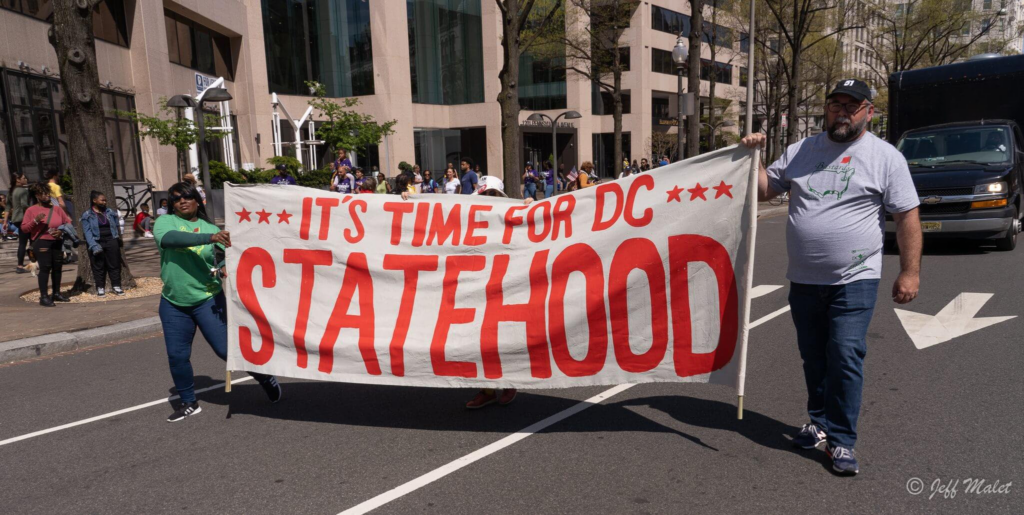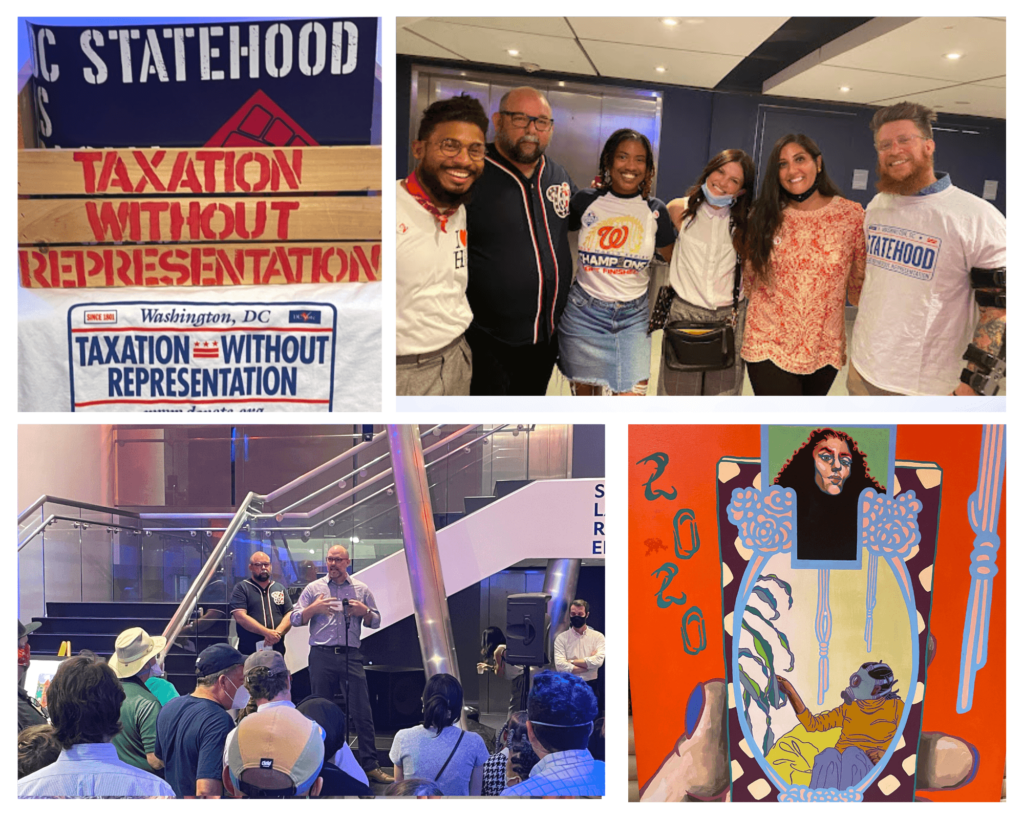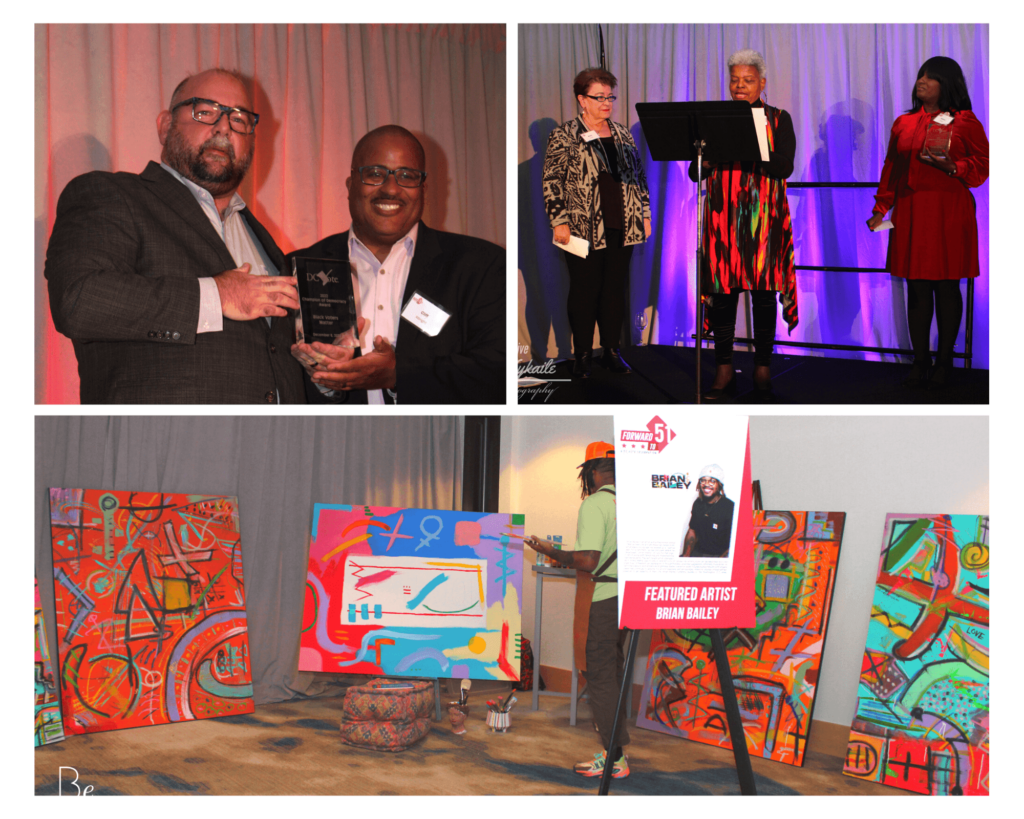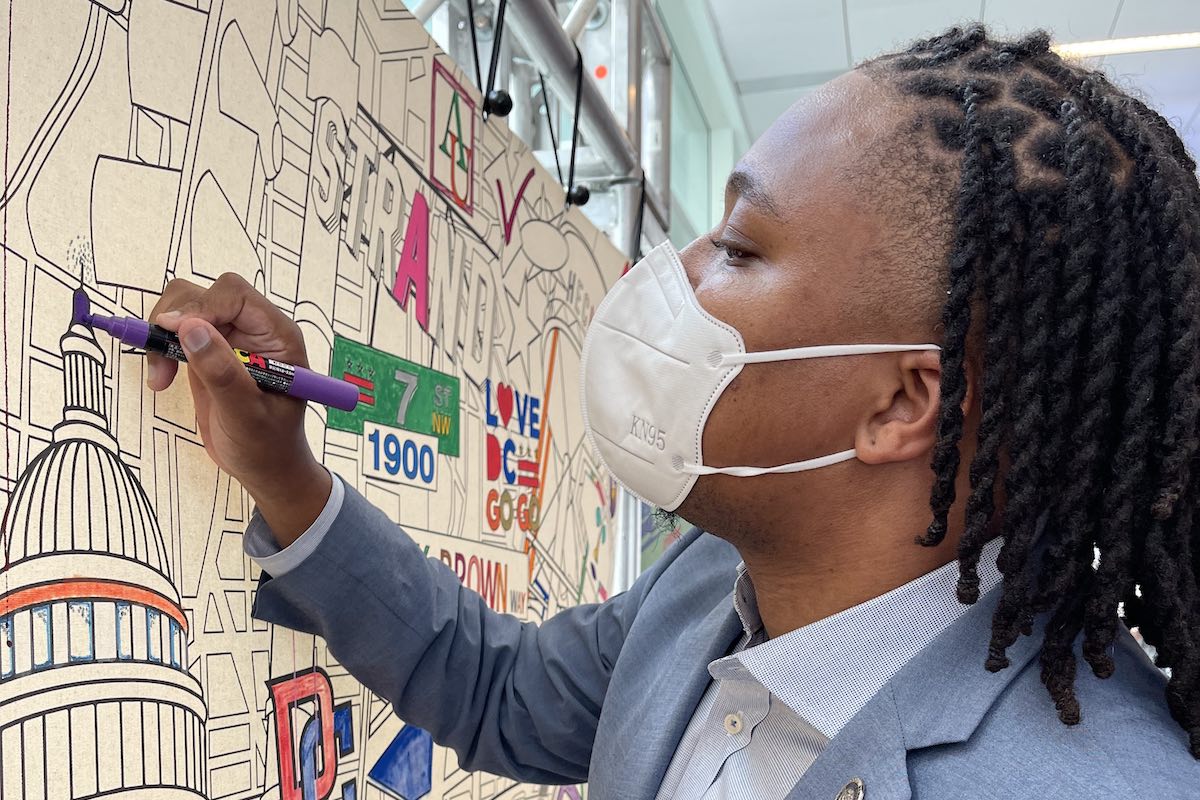Summer is here
Summer is here and we’re living it up to the fullest here at DC Vote! But, in between all the summer barbecues, pool days, and fun in the sun, we wanted to bring you a quick rundown of what we’ve been up to these past few months!

First, May 16th was a big day in the Capitol – we showed up in droves to support Mayor Bowser as the House Oversight Committee questioned her on all things DC. Meanwhile, the Senate voted to down the Comprehensive Policing and Justice Reform Amendment Act of 2022 – a blatant attack on DC’s autonomy.

But that’s not the end of the story! On May 25th, President Biden made good on his promise to veto the disapproval resolution, protecting the local police accountability act.

As June kicked off, the House Oversight Committee turned its focus to DC elections, holding a hearing on June 7th. You already know we showed up and showed out for Statehood!

And we came together to celebrate PRIDE! The fight to protect LGBTQ+ rights goes hand-in-hand with our efforts for Statehood. Each is a movement for full representation and equality under the law.

Special shoutout to our very own Kelsey Adams, who represented DC Vote at the young dems convention in Las Vegas.

Our traveling mural made a pit stop in Atlanta with the Center for Artistic Activism.

Congress introduced two bills affecting our budget, our elections, and our safety, so we did what we do best and rallied together with 70 allied organizations to make it clear we won’t tolerate interference in DC’s laws.

Our team traveled to Chicago for netroots nation 2023 and hosted a screening of Higher Power, a film about DC’s cannabis laws and how they affect our community.

Last but definitely not least, DC Vote came out to represent Statehood at Broccoli City – an initiative that mobilizes young people, communities, and community organizations to work collaboratively to create a more racially equitable world.
These past few months have been…WOW
First, on January 6th we gathered in front of the US Capitol to commemorate the attempted insurrection and to call and uplift the need for Our Freedoms and Our Vote.

Then, Congresswoman Eleanor Holmes Norton introduced the Washington, DC Admission Act (again) to the 118th Congress. The DC Statehood bill previously passed the House in June 2020 and again in April 2021. It’s 2023 and it’s about time for Congress to follow through and finally grant DC the representation we’ve been fighting so hard for.

In February, we found out the true cost the lack of Statehood is having on 700,000 DC residents. The revenue DC is missing from being denied full taxing authority is a whopping $3.2 billion according to DC Fiscal Policy Institute (DCFPI) analysis.

We held the #HandsOffDC Rally to remind certain Congressmembers not to mess with DC Home Rule and our lawfully passed legislation.

And our very own Executive Director Bo Shuff told his story on gaining Austrian citizenship in 96 hours to The Washington Post!

On March 23rd we took part in Lobby Day, introducing the new members of Congress to the people of DC and making our voices heard for Statehood, voting rights, and equality.

And we can’t forget taking the stage at South by Southwest in Austin alongside go-go dancers to rally the crowd for DC Statehood as part of “SXSW A Go-Go.”

2022: A year of art, activism, and Statehood
On March 9th, we commemorated the 57th anniversary of the 1965 Selma-to-Montgomery March and the ongoing fight for voting rights in Selma, Alabama. Our Executive Director Bo Shuff and Program Director Kelsye Adams joined Black Voters Matter, League of Women Voters, The Transformative Justice Coalition and more to march in the footsteps of Dr. Martin Luther King and John Lewis, calling for voting rights, Statehood and justice for all. Our team was proud to be part of this historic day of action. We even got the media talking with live coverage from Black News Channel during the event.
For Emancipation Day on April 16th, we partnered with a coalition of organizations to support District festivities and host a series of interactive pop-ups for Statehood in all 8 Wards. Some of these activations included a calming yoga session, the iconic Statehood GoGo truck, and DJ & Flash Mob teaching the beloved Statehood dance (yes, there’s a DC Statehood dance, and it’s fire!)
The event was topped off with joining the Emancipation Day Parade where we carried our DC Statehood sign proudly for emancipation and full representation for all. In 2023, we will continue participating in actions and demonstrations for voting rights, equality, and Statehood — will you empower our work with a donation of $5.51 or any amount today?

If you’ve saved your payment information with ActBlue Express, your donation will go through immediately:
| Express Donate $5 | Express Donate $25 |
| Express Donate $50 | Express Donate $100 |
| Express Donate $250 | Donate Other Amount |
On August 29th, we got arty with it and hit it out of the park with our “Art Drives Statehood” fundraiser at the Atlas Theater. The event was hosted by Eireann Dolan and her husband, Nationals’ Pitcher Sean Doolittle, Chris “Cardi” Clayton from CHRiS CARDi House of Design, and Pie Shop DC’s Sandra Basanti. Over 200 guests joined us in celebrating our mission for representation for DC — while viewing and purchasing some stunning Statehood-themed artwork.

We sold every piece of art available, received coverage on the local channel WUSA and secured a Washington Post story as well! Proceeds for this event benefited local organization Art Enables, an art gallery and vocational arts program dedicated to creating opportunities for artists with disabilities to make, market, and earn income from their original artwork!
To close out the year, we shook things up with “The UnGala,” a one-of-a-kind celebration of Statehood where we honored U.S. Senator Chris Van Hollen, Arena Stage, and Cliff Albright and LaTosha Brown of Black Voters Matter for their dedication to our movement. We met and exceeded our ambitious fundraising goal as 200 friends and allies joined us to celebrate the progress forward.

Quarterly Update for July – October 2022
As we enter the final stretch of 2022, we’re looking back at the stellar run of events, activations, and celebrations for DC Statehood this quarter.
First, we ended July on a high note as we joined the Anacostia Coordinating Council (ACC) and the Marion Barry Summer Youth Employment Program for a ceremony and concert for “Youth Voices for DC Statehood.”
Then, in August, we kicked things off at Netroots Nation in Pittsburgh, where we not only had a successful “Art Drives Statehood” interactive mural at the event but also participated in panels to spread the word about Statehood and networked with colleagues from all across the country!

On August 29th, we launched our “Art Drives Statehood” initiative at the Atlas Theater. Over 200 friends and allies met our hosts Eireann Dolan and her husband, Nationals’ Pitcher Sean Doolittle, Chris “Cardi” Clayton from CHRiS CARDi House of Design, and Pie Shop DC’s Sandra Basanti. Guests joined in celebrating our mission for representation for DC while viewing and purchasing some gorgeous Statehood-themed artwork. We sold every piece of art available and secured a Washington Post story and coverage on the local channel WUSA.
Proceeds for this event benefited local organization Art Enables, an art gallery and vocational arts program dedicated to creating opportunities for artists with disabilities to make, market, and earn income from their original and compelling artwork!


On September 17th, we joined the League of Women Voters, DC, for the Envisioning Statehood conference. Held at the University of the District of Columbia, our very own Kelsye Adams participated in panels and discussions on the future of the Statehood movement.

September 24th was the NextFest at Malcolm X Park, where we had another interactive “Art Drives Statehood” mural that was popular with attendees. It was a beautiful display, and we were proud to engage the community with art and activism for the Statehood movement.

And in early October, we rallied at the Supreme Court to push for equal representation for the people of DC who don’t have a voice in Congress.

And during the Annual Legislative Conference (ALC) hosted by the Congressional Black Caucus (CBC), Kelsye Adams participated in some activities with activists who came to town, calling for justice and democracy for all.
From Fringe to Winnable: The Campaign for DC Statehood
Originally Published on The Forge, Sept 1, 2020
Long considered a long-shot local issue, DC statehood is now a winnable campaign. Barbara Helmick tells the story of how changing the narrative allowed organizers to build the coalition they needed to win.
When President Obama eulogized the legendary civil rights organizer and congressman John Lewis, he urged us to carry forth Lewis’s work to expand voting rights and end voter suppression. One of the examples he listed was representation for the people of Washington, DC.
It may sound obvious that voting rights for DC would be included on a list of priorities for strengthening our democracy. But, only a few years ago, it was not. Progressive organizations and some members of Congress were sympathetic, but most saw DC Statehood as an outlier issue. They assumed passing statehood would require bipartisan support and didn’t see a strategy or strong enough movement to achieve that. In fact, Obama himself didn’t mention DC statehood until the last year of his presidency, and only then when asked by a local high school student.
In all fairness to Obama, the political momentum for DC statehood is relatively recent. When Obama was elected in 2008, a coalition of organizers and elected officials, led by DC Vote, were pushing a bill to give DC residents representation in Congress but not full self-rule. Backed by Republican Tom Davis of Virginia, the bill came close to passing but for the last-minute machinations of the National Rifle Association. The coalition backing the bill fractured in the wake of the failed effort, and it took years to recover. The tenacious, all-volunteer local statehood movement kept the statehood issue alive and, in 2012, convinced Eleanor Holmes Norton (DC’s non-voting delegate to Congress) to re-introduce a statehood bill which she hadn’t done in several years. Over the next few years, local organizations worked with her to secure cosponsors for the bill.
It wasn’t until early 2016 that DC Vote, where I now serve as the Program Director, moved towards making full statehood our priority. Critically, over the next few years we reframed statehood as a national issue of voter suppression. Changing the narrative about statehood — from an unfair constitutional quirk to a blanket suppression of federal voting rights — expedited our conversations with congressional staffers, raised the stature of our issue as a national concern, earned us a seat at the national voting rights organizations tables and resulted in dramatically more sponsorships for the statehood legislation. The broad, national coalition we subsequently formed allowed us to build momentum and power to build Congressional support and to put winning in our sights for the first time in 200 years.
Organizing the Grassroots for Statehood
In the spring of 2016, DC Vote brought on Bo Shuff, a former campaign manager for DC Mayor Muriel Bowser who also brought over 20 years of experience in national advocacy work, giving DC Vote a foot in both local and national politics. Combined with my 43 years of grassroots campaign work on both a national and local level, we brought a whole new perspective and range of experiences to DC Vote’s operation.
When Mayor Muriel Bowser introduced a bold and clear statehood plan on Emancipation Day that year, we were primed to jump in. The Mayor’s plan called for a statehood referendum on the November ballot. This provided a clear focus, unifying key players around a common goal and giving us a rallying point to bring other local progressive organizations into the fight.
DC Vote’s canvass operation reached thousands of residents, solidifying and activating local support for the ballot initiative. Neighborhood groups such as Neighbors United for Statehood, Stand Up! For Democracy in DC (Free DC), and the DC League of Women Voters also rallied their networks in favor of the referendum and UNITE HERE Local 25 assigned an organizer to work full time on the campaign.
The grassroots organizing paid off. A whopping 86 percent of voters — in the largest turnout in the District’s history — supported statehood.
Building National Support
With the referendum on statehood accomplished, DC Vote turned our attention to building the power necessary to advance the campaign on a national level. Our first step was to tackle the winnability question. Bo wrote a strategy paper on behalf of DC Vote, which we circulated to local statehood organizations, the Mayor’s Office, and Congresswoman Norton’s office. In the paper, we called for more funding for a campaign to pass statehood, set an ambitious timeline for congressional action, and planted the idea that a statehood bill could pass in the Senate with a simple majority vote (either through the reconciliation process or by suspending the filibuster for statehood legislation).
We continued our local grassroots organizing, tabling at street fairs, canvassing for support at DC’s State Fair (yes, we have one), attending local organizations’ meetings, speaking at schools. But we knew winning the backing of the national progressive community was critical to winning congressional support. Bo and I used our organizing skills to reach out to just about everyone we had ever worked with, raising awareness about our campaign, asking for advice, and calling on them to join us in the fight.
We stuck our toes in almost any door we could. We attended conferences and piped up on conference calls. We were often met with polite but confused silence, but we kept at it. We reached out to the groups most impacted by congressional Republicans’ practice of putting riders on the federal budget to block DC legislation, including Death with Dignity and pro-choice organizations. And we accepted almost any invitation to speak. When the National Cannabis Festival and Policy Summit invited us to speak on DC’s inability to legalize (and commercialize) marijuana, we came wearing our “WEED Like Statehood” T-shirts.
We knew that to make progress within the national progressive movement, we also needed to demonstrate our legislative chops by winning more support for statehood in Congress, where support was still thin. Most members of the House Progressive Caucus had not cosponsored the statehood legislation, nor had members of the Hispanic, Asian Pacific Islander, and LGBT Caucuses. DC Vote stepped up to take over the Community Capitol Hill Days (that is, lobby days but with a focus on education), which local statehood groups had been organizing for several years. With paid staff and organizational resources, we created a visibly powerful operation by dramatically increasing the number of appointments with Congressional offices and staying in communication with staffers after our visits. In early 2017, over 200 DC residents turned out for the Community Capitol Hill Day. Many had never taken such an action, but all were newly outraged that they had no voice in the new political climate our nation was dealing with. We began to see new co-sponsors to the statehood legislation.
It was a good start, but we knew we needed to do much more to build the level of power necessary to win. We needed to earn more allies in Congress and among national progressive groups, we struggled with how.
I remember the day. I had just gotten off one of the progressive groups conference calls and it struck me. I went into Bo’s office and said, we need to call our situation voter suppression. He looked at me for a minute and then said, I think that might be brilliant.
We realized that we needed to speak the language that the progressive groups spoke. We needed to cut to the chase with the Democrats in Congress. They would immediately know what we were talking about. It wasn’t about some quirk in the constitution, it was about preventing black and brown people from having representation in our federal government.
Calling for an end to the injustice of the blanket suppression of federal voting rights to all the voters in DC became the new frame for why statehood.
Organizing Works
When we took our voter suppression narrative to Capitol Hill, we soon saw results from Congressmembers committed to fighting voter suppression. We organized a Hill Staffer Day, in which we educated congressional staffers (many of whom live in the District) about statehood. Many had “aha” moments when we framed the issue of statehood as an issue of voter suppression; this made sense in a way the historical narrative and general unfairness had not. We saw a significant increase in the number of cosponsors for the statehood bill.
With the wind in our sails from momentum in Congressional sponsorships, we began to push in earnest to win more allies across the progressive movement. One effort was our 2019 Netroots Nation conference plan. We chartered an Amtrak car, invited DC folks going to get on the train for statehood, had a fun trip talking statehood to environmental activists, progressive group staffers, a broad range of staffers from the very groups we were reaching out to. We got Congresswoman Norton to be one of the keynote speakers where she reported it was her first speech to a national audience. We brought eight young statehood activists, we all wore our statehood T-shirts creating a very visible presence and moved the dial of progressive awareness of our campaign to win.
In reaching out to the progressive groups, we had a ladder of asks; if they hadn’t ever endorsed, do that, if they had then it was time to take action. We asked organizations that scored votes to include statehood. We signed on to other organizations’ voting rights letters and asked them to sign on to ours. Some groups got their state affiliates to push for new co-sponsors for the statehood legislation, giving momentum to Eleanor Holmes Norton’s efforts.
Most progressive groups had long been in favor of DC Statehood. Once we had developed a plausible path to winning, and had shown powerful progress, it was a natural move for them to include statehood among their organizations’ priorities.
As we moved toward a vote on HR51, the statehood bill, we recruited a broad base of national organizations to a Statehood Table. Diverse organizations, including People for the American Way, The Leadership Conference for Civil and Human Rights, Planned Parenthood, the League of Conservation Voters, Clean Water Action, AFL-CIO, HRC, and the League of Women Voters, sent staff to strategize about how we could finally pass statehood legislation in a chamber of Congress. The Hub Project, a group working to end the filibuster, created its own campaign called “51 FOR 51.”
Our allies wrote blog posts, promoted HR 51 on social media, and recruited their members to attend the House Oversight and Reform Committee hearing in September 2019. One thousand people showed up the day of the hearing, including greeters at the Metro stop and cheerleaders outside the Cannon doors. There were so many supporters that, at the last minute, we set up a jumbotron and chairs for overflow space in the aptly named Liberty Park. At the end of the day, there was an outdoor go-go concert for statehood. The whole day made visible the depth, diversity, professionalism, and passion of the national movement. For the first time, statehood trended on Twitter.
We had succeeded in lighting the fire. We captured the attention of the Democratic leadership. Norton’s office along with our many allies were able to build on the momentum we created and go into the historic House vote on June 26, 2020 and pass HR51, The Washington DC Admission Act with all but one Democratic House members voting yes. After over 200 years of effort, this was a truly historic victory.
Our strategy was for this historic House victory to give momentum to increasing co-sponsorships in the Senate. It worked. All the 2020 Senate co-sponsors came in June and July, right before and after the House vote. Senate Minority Leader Schumer spoke in favor of DC statehood on the Senate floor, and Senator Carper held a hearing. This positions us to be ready for a new Senate voted in this fall to vote in favor of statehood next year – at last giving the people of DC full federal representation and real self-government.
GOING FORWARD
The need for DC statehood is clearer than ever, as are the risks to our democracy of continuing to deny voting rights to nearly one million Americans, many of them people of color. When the president mobilized troops against peaceful protesters on the streets of DC, the Mayor used her new national platform to lift up the racist roots of disenfranchisement, which stemmed from Congressional fear of giving power to a majority Black city. The discrimination faced by the people of DC since 1801 has now become part of the national conversation about how to root out structural racism in our country.
As our campaign goes forward, we’re working to expand our narrative to include the treasured principles of American democracy: representation and the right to self-government. We believe that focusing on these principles will resonate with a wide audience of Americans — and we want them all on board. We need to head off any compromise deal that wins us only half a loaf by merging with Maryland. We’re drawing inspiration from the fights for affordable health care and marriage equality, both of which ultimately secured victory through narratives that focused on powerful, unifying principles in addition to arguments for equal rights and access under the law.
We need our wide-ranging coalition to stay unified, in communication, and ready for whatever 2021 brings. We are ready to seize the momentum we’ve built to pass statehood legislation in the first 100 days of a new administration. If the results of the fall elections aren’t so favorable, we’ll fight on. We’re now part of a wide, national coalition, and, together, we will continue the fight for full democracy.
